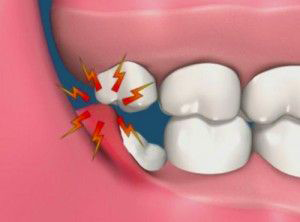Does it make sense, to remove Wisdom teeth?
What is the reason behind the removal of so many wisdom teeth in teens and young adults? We will see why dentists and oral surgeons recommend the extraction of wisdom teeth.
Problems can arise if wisdom teeth are not extracted
Wisdom Teeth, also called third molars, often start growing around the age of 16. Unfortunately, most people’s mouths are too small or too narrow to accommodate these new teeth. When there is not enough space for wisdom teeth to grow comfortably, it can trigger a cascade of problems, ranging from chronic headaches to severe damage to adjacent teeth.
To avoid problems, dentists and oral surgeons recommend having your wisdom teeth removed when they seem to be growing. Removing them before they are completely removed will avoid encountering many problems that can cause a lot of pain and even require other dental procedures.
Examples of problems that arise from not removing wisdom teeth
The presence of wisdom teeth can lead to a wide range of problems, from infection and migraines to overcrowding, bad breath, and severe headaches or pain when they’re not removed. Sometimes a person only has one problem with their wisdom teeth, while sometimes they have a combination of problems.
Here are some examples of problems that can arise if we don’t Remove Wisdom teeth
- Chronic pain in the lower jaw.
- Swelling and inflammation of the jaw.
- Sore and inflamed gums that may bleed or become infected
- Bad breath which doesn’t seem to recede
- Loss of gums or bone in the upper or lower jaw
- Infection: This can happen when wisdom teeth partially erupted as food and bacteria get stuck around the tooth and infections can develop.
- Severe gum disease
- Damage to surrounding teeth
- Crowding causes displacement and displacement of the permanent teeth
Usually, if you have a problem with your wisdom teeth, you may encounter others in the future. Oral surgeons will recommend that you have your wisdom teeth removed when you have problems for the first time to avoid other more serious problems in the future.
What if the wisdom teeth are not removed?

If you choose not to have your wisdom teeth removed, you run the risk of suffering from several chronic problems. Some of the problems that can arise if your wisdom teeth are not removed include:
- Recurring infections
- Chronic pain in the jaw due to the development of growth, cyst, or tumor near the wisdom teeth.
- Bad breath that never goes away
- The teeth move to the point where you need orthodontic treatment to improve your smile
- Tooth decay occurs on wisdom teeth and surrounding teeth because they are difficult to clean properly.
- Severe gum disease
Even if you have no severe problem? Your wisdom teeth may still need to be removed
Even if you think you don’t have any issues with your wisdom teeth, you may need to have them removed. Wisdom teeth can appear asymptomatic, but they can cause problems that are neither visible nor noticeable.
An oral surgeon can assess your situation and determine whether wisdom teeth need to be removed. Sometimes when your wisdom teeth are asymptomatic and your oral surgeon doesn’t notice any problems, you may be able to take a “watch and wait” approach. This means your wisdom teeth do not need to be removed, but they do need to be watched as they can cause problems at any time.
If you have problems with your wisdom teeth and need to have them removed, or would like an oral surgeon to examine you and determine if they need to be removed, please call Dental Zone. Our experienced oral surgeon will assess your case and determine whether your wisdom teeth need to be removed.
Call our dental office today to schedule a consultation to discuss the extraction of your wisdom teeth.
